Educational Support Through NOAA
NCEI News Feed
http://www.ncei.noaa.gov/news/educational-support-through-noaa
Find NOAA-sponsored authoritative educational resources free for the public.
NCEI News Feed
http://www.ncei.noaa.gov/news/educational-support-through-noaa
Current Watches, Warnings and Advisories for Brown (WIC009) Wisconsin Issued by the National Weather Service
https://alerts.weather.gov/cap/wwacapget.php?x=WI125F40C91BF0.HydrologicOutlook.125F40D87280WI.GRBESFGRB.86a65ce9a4bb9b6c9b39683aa1d37e47
Great Lakes Echo
http://greatlakesecho.org/2020/03/18/rising-waters-threaten-wells-drinking-water-systems/
Our Great Lakes communities are heading into uncharted waters as the COVID-19 pandemic evolves. Protecting our health and the health of those around us is top of mind.
As local, state, and national health and safety officials respond to this crisis, the new mantra for all of us has become: wash your hands. This most basic hygiene advice is a stark reminder of the critical importance of clean water to our personal health, and the health and safety of our families and our communities. Surrounded by the Great Lakes, our region can lead by making sure everyone has access to the clean water they need right now.
We commend the cities and other government entities that are taking action to halt water shut-offs and restore residential water service during this crisis, including Cleveland, Detroit, Toledo, Akron, and many others around the Great Lakes region. We urge states to use their power, as was done in Ohio, Wisconsin, and other places, to direct water utilities under their jurisdiction to halt shut-offs and restore water services.
The deepening COVID-19 crisis reinforces the inseparable connection between water and public health. This crisis is going to take a commitment from all levels of government to ensure that everyone has access to the clean water they need, and the Alliance is ready to work with any state or local officials looking for guidance in this critical area. We also encourage you to support the many local environmental and civic organizations working directly in our Great Lakes communities to ensure all residents have access to safe, clean water.
So, what can you do to help? First, be sure to heed the advice of your local, state, and federal health and safety officials. The Centers for Disease Control (CDC) and the World Health Organization (WHO) have helpful, easy-to-understand information on precautions against COVID-19 to keep yourself, your family, and your community safe.
Second, find ways to support your local community by donating to relief efforts and contacting elected officials to ask that water shutoffs be halted and services be restored. We’ll be using the Alliance’s social media channels to share local opportunities to get involved. You can also follow the hashtags #TurnWaterOn #KeepWaterOn #MakeWaterAffordable to join the conversation on social media.
If you need help getting the word out, tag us on Facebook, Twitter, or Instagram and we’ll do our best to amplify the important efforts happening in Great Lakes communities.
Our staff around the Great Lakes region remain hard at work. We have taken steps to respond to this crisis to protect the health and safety of our staff and volunteers. Our staff are now all working from home but are accessible via their regular email and phone. We are shifting upcoming volunteer training events, community outreach meetings, and other group activities to online events. To protect the health of our supporters and communities, we have canceled all in-person volunteer events, including Adopt-a-Beach events, for at least the next month.
Thank you for your ongoing support of clean water.
The post Clean water is important now more than ever appeared first on Alliance for the Great Lakes.
News – Alliance for the Great Lakes
News – Alliance for the Great Lakes
https://greatlakes.org/2020/03/covid-19-crisis-clean-water-update/
Where else can you spend your summer on the water, be part of living history, and get paid for it?
The Fox Locks are hiring for seasonal lock tenders–and since we are the only fully-restored hand-operated lock system in the nation, this is a unique job. The locks are opened and closed using a hand operated turnstile (it’s not hard to open the locks) and you can learn more about the operation in this short video:
For Scott Thompson, 2020 will be his 12th year as a lock tender and he loves it because he’s outside and no day is just like the day before. He also likes the unique history associated with the lock system.
“Working these locks is like instant time travel back to the late 1800s,” Thompson said. “Chatting with the boaters can be entertaining too. They’re usually full of questions about the locks and quite appreciative of the manual labor put into helping them get through.”
If you’re a newbie to the lock system, it was originally constructed in the 1850s and was the first transportation system in the State of Wisconsin. To learn more about the history of the lock system, visit this link.
The job is ideal for someone who loves working outside during a nice Wisconsin summer, likes interacting with the public, and wants to be part of the 170-year history of the Fox Locks.
To apply, visit our careers page and follow the directions!
Blog – Fox Locks
http://foxlocks.org/2020/03/17/summer-jobs-open-be-a-lock-tender/
Current Watches, Warnings and Advisories for Brown (WIC009) Wisconsin Issued by the National Weather Service
https://alerts.weather.gov/cap/wwacapget.php?x=WI125F40BB12F8.HydrologicOutlook.125F40C93040WI.GRBESFGRB.86a65ce9a4bb9b6c9b39683aa1d37e47
Go ahead and hit the play button up top and enjoy one uninterrupted minute of the waters of Lake Superior crashing against the Marquette, Michigan shoreline. Read the full story by WJHL News.
Great Lakes Commission
https://www.glc.org/dailynews/20200317-break
In Ontario, as the municipality of Chatham-Kent works to shore up the deteriorating Erie Shore Drive dike, staff has investigated potential. Read the full story Chatham Daily News.
Great Lakes Commission
https://www.glc.org/dailynews/20200317-costs
For over 70 years, Wood Soil and Water Conservation District has worked with local farmers to improve their farmland while protecting our natural resources. Many of those efforts are currently aimed at reducing soil loss and keeping phosphorous out of our ditches, river and Lake Erie. Read the full story by Sentinel-Tribune.
Great Lakes Commission
https://www.glc.org/dailynews/20200317-loss
Top hat ceremonies scheduled for the Welland Canal’s opening next week have been cancelled in response to the COVID-19 crisis. Read the full story by The Standard.
Great Lakes Commission
https://www.glc.org/dailynews/20200317-canal
Officials in the city of Oswego are planning to spruce up a gravel drive and parking lot east of Fort Ontario and transform the area into a small park and public boat launch into Lake Ontario. Read the full story by Oswego County News Now.
Great Lakes Commission
https://www.glc.org/dailynews/20200317-park
The U.S. Coast Guard properly developed and approved a plan to deal with worst-case scenario oil spills near the Great Lakes in northern Michigan, a federal court ruled. Read the full story by Bloomberg Environment.
Great Lakes Commission
https://www.glc.org/dailynews/20200317-oil
The Ohio Department of Natural Resources’ 2018 and 2019 walleye surveys offer unprecedented numbers of fish in the lake. Read the full story by Great Lakes Now.
Great Lakes Commission
https://www.glc.org/dailynews/20200317-walleye
By Elise Ertl, University of Wisconsin-Superior
As part of the River Talks series, Vern Northrup presented his five-year photography journey titled, “Akinomaage: Teaching from the Earth,” on March 3 at the St. Louis River Summit held at the Duluth Entertainment Convention Center. He explained how he was able to use photography to show connection between Earth and spirit and the relationship between sustainability, growth and fire.
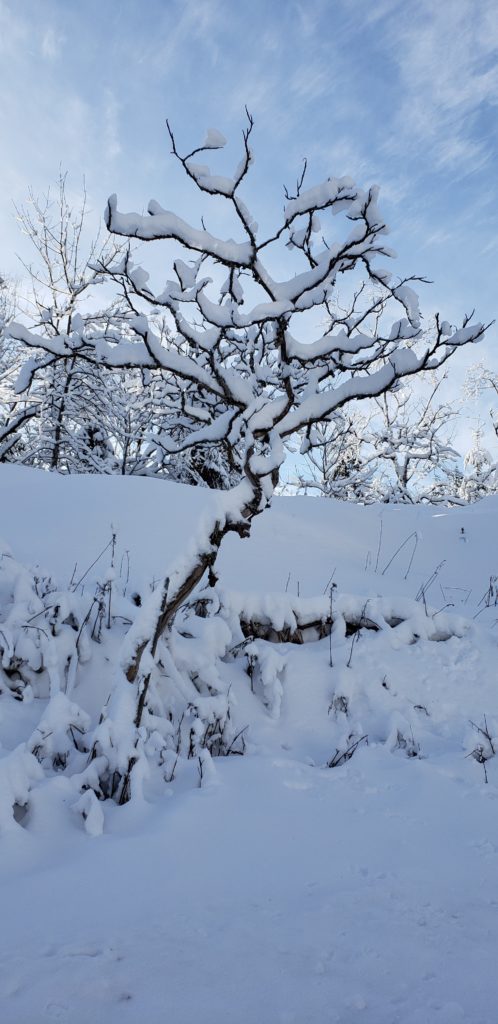
“Biboon” (winter) — an image from Vern Northrup’s photography book.
Northrup got his start when he was asked five years ago to have an exhibit at Duluth’s American Indian Community Housing Organization. He was presented with his next opportunity when the Duluth Art Institute asked him to create an exhibit, which is his now photography book, “Akinomaage: Teaching from the Earth,” the first book the institute has published.
Northrup, a member of the Fond Du Lac Tribe of Lake Superior Chippewa, began his talk by explaining how the tribe finds their connection with nature. “The way we look at everything out there is that everything has a spirit. Everything that has been created, the Earth, the moon, the river, the water, has a spirit, and that is how we treat them, one spirit to another.”
Having this deeper connection with nature led to the inspiration that lies behind Northrup’s photos. As he began showing the contents of his photo book, he provided the audience with insight into how these spirits have influenced the way tribal members live. Gitchi-Gami-zibi, also known as the St. Louis River, has been a major influence in their lives.
“In the water, there are mermen and mermaids. They love us so much, they want us to come live with them. Of course, we cannot, so we show our appreciation by making offerings to them, and in return, they protect us,” Northrup said.
This is only one example of many that have become integrated as a part of their lives. The sumac tree, milkweed buds and wild animals are a few more of the important integrated benefits in their lives, providing food, medicine and tools. Northrup showed one unique photo of red leaves on a tree forming a phoenix, representing a culture that is ever rising, and the adaptation that it takes to thrive.
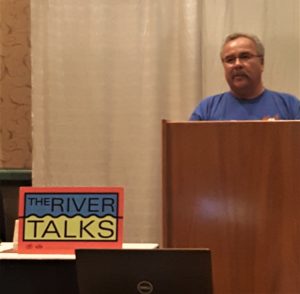
Vern Northrup
Northrup also worked with ishkode (fire) for a number of years and was invited to Stockton Island to return fire to sustain this part of the Apostle Island National Lakeshore. Northrup said the Anishinaabe used to burn there for thousands of years for blueberries. Island blueberries became a valuable trade item because of their varying, yet close, harvest time compared to berries on the mainland.
“The indigenous people in America had over 700 uses of fire to shape their environment. For whatever reason. It could have been anything from war, to cooking bugs, to everything,” Northrup said.
He added that the purpose for fires was to attract different types of animals at certain times of the year, to encourage blueberry growth, or to add nutrients for the wild rice. “Fire is a cleanser of the land and the air,” he said. By burning the land, they were able to encourage new growth of food and plants that otherwise had not emerged in years.
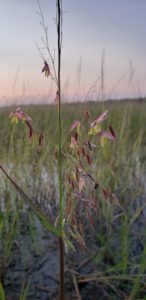
Flowering wild rice — an image from Vern Northrup’s photography book.
A member of the audience asked how Northrup chooses what to photograph. His response was, “Some days I go out there, and I tell myself to sit down and listen to what’s around me to try and learn something. I enjoy taking pictures of the woods here. I’ve spent my time travelling, and now the woods are where I want to stay.”
The April River Talk, “What Tourism Means for the River,” will be postponed until a later date due to the Cornonavirus. If you’d like to get on the email list for River Talk notifications, please contact Science Communicator Marie Zhuikov at mzhuikov@aqua.wisc.edu.
Blog – Wisconsin Sea Grant
https://www.seagrant.wisc.edu/blog/catching-spirits-through-a-lens/
Great Lakes Echo
http://greatlakesecho.org/2020/03/17/michigan-links-trains-and-bikes/
Wisconsin Water Library
https://waterlibrary.aqua.wisc.edu/wisconsin-water-library-and-covid-19/?utm_source=rss&utm_medium=rss&utm_campaign=wisconsin-water-library-and-covid-19
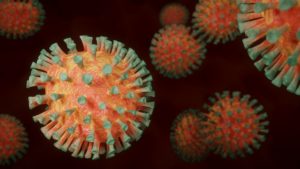
Due to the effects of Covid-19, these are unprecedented times for all of society, including water science and outreach at Wisconsin Sea Grant. While our staff continues to adapt to this changing situation, we remain committed to the mission of promoting the sustainable use of Great Lakes resources through research, education and outreach.
Our program is one of the University of Wisconsin System’s and is housed on the flagship campus in Madison. On March 15, the University of Wisconsin-Madison chancellor called for telecommuting among staff and programs with that capability. That employee policy also affects our field offices in Milwaukee, Superior, Green Bay and Manitowoc, though local campus policies may additionally affect their office operations. Staff remains available through email and the phone.
Our social media accounts, Facebook and Twitter, are also a good means to stay current with our activities, particularly outreach events that may now be moving from face-to-face to virtual formats as we cancel larger gatherings and meetings in accordance with public health guidelines for social distancing.
In terms of grant submission and management, we work with the UW-Madison Office of Research and Sponsored Programs, and similar offices on other campuses. We will continue that work to ensure continuity during this uncertain time.
The Wisconsin Water Library has temporarily closed. However, please reach out for assistance with reference questions or resource discovery. The senior special librarian, Anne Moser, is available. She has also assembled some useful STEM educational resources for distance learning.
We have a robust website offering publications on the Great Lakes and other water topics. Many resources are downloadable. Under normal circumstances, other items would be available in hard-copy form and at your request that we mail the materials. However, our office is temporarily closed and campus mail service is suspended.
We are offering only an electronic version of issue 2, 2020, of our quarterly newsletter, the Aquatic Sciences Chronicle. Many of our readers continue to work remotely and we have chosen to not expend resources to produce and mail hard copies of the publication to empty offices. Prior to production of issue 3, 2020, we will evaluate distribution plans. You can also sign up to get an emailed version or go here to read our latest edition.
Please contact us if you have questions or concerns, and please stay healthy. Here is a reminder of the reliable sources for Covid-19 information and guidance:
American Public Health Association
News Releases – Wisconsin Sea Grant
News Releases – Wisconsin Sea Grant
https://www.seagrant.wisc.edu/news/operations-during-covid-19/
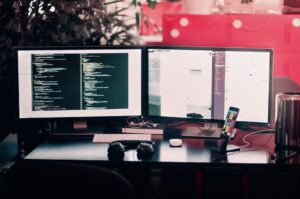
Due to the effects of COVID-19, these are unprecedented times for all of society, including water science and outreach at the University of Wisconsin Water Resources Institute. While our staff continues to adapt to the new reality, we remain committed to the mission of coordinating research that works to address present and emerging water quality, quantity and management challenges.
Our program is one of the University of Wisconsin System’s and is housed on the flagship campus in Madison. On March 15, the University of Wisconsin-Madison chancellor called for telecommuting among staff and programs with that capability. That employee policy also affects our field offices in Milwaukee, Superior, Green Bay and Manitowoc, though local campus policies may additionally affect their office operations. Staff remains available through email and the phone.
Our social media accounts, Facebook and Twitter, are also a good means to stay current with our activities, particularly outreach events that may now be moving from face-to-face to virtual formats as we cancel larger gatherings and meetings in accordance with public health guidelines for social distancing.
In terms of grant submission and management, we work with the UW-Madison Office of Research and Sponsored Programs, and similar offices on other campuses. We will continue that work to ensure continuity during this uncertain time.
The Wisconsin Water Library has temporarily closed. However, please do reach out for assistance with reference questions or resource discovery. The senior special librarian is available.
We have a robust website offering publications on the Great Lakes and other water topics. Many resources are downloadable. Under normal circumstances, other items would be available in hard-copy form and at your request that we mail the materials. However, our office is temporarily closed and campus mail service is suspended.
We are offering only an electronic version of issue 2, 2020, of our quarterly newsletter, the Aquatic Sciences Chronicle. Many of our readers continue to work remotely and we have chosen to not expend resources to produce and mail hard copies of the publication to empty offices. Prior to production of issue 3, 2020, we will evaluate distribution plans. You can also sign up to get an emailed version or go here to read our latest edition.
Please contact us if you have questions or concerns, and please stay healthy. Here is a reminder of the reliable sources for COVID-19 information and guidance:
American Public Health Association
The post Operations in Response to COVID-19 first appeared on WRI.
News Release – WRI
https://www.wri.wisc.edu/news/operations-in-response-to-covid-19/
The discovery of 51 invasive carp in the Mississippi River on the southeastern Minnesota-southwestern Wisconsin border — the largest number of invasive carp found so far upstream — has state authorities mobilizing to boost netting and monitoring of the destructive fish. Read the full story by Minnesota Public Radio News.
Great Lakes Commission
https://www.glc.org/dailynews/20200316-mississippi-carp
Jia Wang, Ph.D., an ice climatologist at the National Oceanic and Atmospheric Administration, admits that this year’s ice coverage prediction model overestimated ice cover and provides a plan to improve the model. Read the full story by Blackburn News.
Great Lakes Commission
https://www.glc.org/dailynews/20200316-ice-predictions
A Michigan county has hired a diver to keep farm fields from flooding amid rising water levels in Lake Huron and other Great Lakes. Read the full story by the Associated Press
Great Lakes Commission
https://www.glc.org/dailynews/20200316-farmland-flooding
Traces of genetic material can help in tracking the invasive species. But a positive detection may not mean live fish. Read the full story by Undark.
Great Lakes Commission
https://www.glc.org/dailynews/20200316-asian-carp
For the first time, an international community-based effort, the Great Global CleanUp: Detroit River, will hold a one-day river cleanup event from 8 a.m. to noon on Saturday, April 25. Read the full story by the News-Herald.
Great Lakes Commission
https://www.glc.org/dailynews/20200316-detroit-river-cleanup
Visitors to the lakefront in New Buffalo, Michigan will see a wall built to hold back water from a rising Lake Michigan. Read the full story by the Northwest Indiana Times.
Great Lakes Commission
https://www.glc.org/dailynews/20200316-lake-michigan-seawall
The City of Vermilion, Ohio and the Western Reserve Land Conservancy have released a rendering of a revitalized Main Street Beach with an expanded beachfront, increased green space, new public amenities, and handicapped-accessible paths. Read the full story by Cleveland News.
Great Lakes Commission
https://www.glc.org/dailynews/20200316-beach-renderings
Five years ago, lead seeped into the tap water in Flint, Michigan, while state and local officials said everything was fine. Now, the same doctor who proved something was wrong is taking the first comprehensive look at the thousands of kids exposed to lead in Flint. Read the full story by CBS News.
Great Lakes Commission
https://www.glc.org/dailynews/20200316-flint-crisis
The announcement of an expedited review of Plan 2014 comes following the awarding of $1.5 million from the U.S., plus $1.5 million from Canada, to address the continuing water outflow problem that exists in Lake Ontario, according to the IJC Great Lakes Connection monthly newsletter. Read the full story by Niagara Frontier Publications.
Great Lakes Commission
https://www.glc.org/dailynews/20200316-ijc-lake-ontario
Indiana lawmakers have passed legislation to embrace a landmark state Supreme Court decision affirming that the Lake Michigan shoreline is publicly owned and open to all for recreation. Read the full story by the Daily Journal.
Great Lakes Commission
https://www.glc.org/dailynews/20200316-lake-michigan-ruling
The U.S. and Ohio environmental protection agencies need to stop resisting their clear responsibility regarding Lake Erie: Enforce the Clean Water Act. Read the full story by the Toledo Blade.
Great Lakes Commission
https://www.glc.org/dailynews/20200316-ohio-clean-lake
Great Lakes Echo
http://greatlakesecho.org/2020/03/16/environmental-journalism-students-recognized-in-michigan-college-better-newspaper-contest/
PRIORITIES FOR ENSURING ACCESS TO CLEAN, SAFE, AFFORDABLE, & RELIABLE DRINKING WATER FOR US RESIDENTS
Recommendations from Great Lakes Community Leaders—March 2020

Freshwater Future and our partners from communities around the Great Lakes visited Federal Representatives in Washington, D.C. to inform them of concerns and needs to address water safety, toxins in water, and affordability.
Click here to view the complete list of drinking water priorities.
Blog – Freshwater Future
https://freshwaterfuture.org/uncategorized/great-lakes-days-drinking-water-priorities-2020/
|
||||||||||||||||||||||
|
||||||||||||||||||||||
|
Blog – Freshwater Future
https://freshwaterfuture.org/uncategorized/freshwater-weekly-march-13-2020/
March 13, 2020 (Cleveland, OH) – As communities around the Great Lakes region respond to the ongoing COVID-19 crisis, cities and other government entities have take action to halt water shut-offs and restore residential water service.
In response, Alliance for the Great Lakes Director of Policy and Strategic Engagement Crystal M.C. Davis issued the following statement:
“The Alliance for the Great Lakes commends the cities of Cleveland, Detroit, and Toledo for ordering moratoriums on water shut-offs and restoration of residential water services during this crisis.
We also applaud Ohio Governor DeWine for directing utilities under the Public Utility Commission of Ohio’s (PUCO) jurisdiction to review shutoff policies and other practices. We urge the PUCO to act quickly to create these protections against the spread of the virus.
The deepening COVID-19 crisis reminds us of the intrinsic connection between water and public health – especially for those in our community who are homebound. This crisis is going to take a commitment to addressing this issue at all levels of government, and the Alliance is ready to work with any state or local officials looking for guidance in this critical area.
We must do all we can at this moment to keep ourselves, our families, and our communities safe, and these shut-off moratoriums do just that.”
###
Media Contact: Jennifer Caddick, jcaddick@greatlakes.org, (312) 445-9760
The post Alliance: “COVID-19 crisis reminds us of the intrinsic connection between water and public health” appeared first on Alliance for the Great Lakes.
News – Alliance for the Great Lakes
News – Alliance for the Great Lakes
https://greatlakes.org/2020/03/media-statement-covid-19-and-water-shutoffs/
The decrease in ice cover is having culture impacts in addition to environmental impacts in Lake Superior’s coastal towns. Read the full story by the Chicago Tribune.
Great Lakes Commission
https://www.glc.org/dailynews/20200313-ice-culture
NCEI News Feed
http://www.ncei.noaa.gov/news/global-climate-202002
Sarnia, Ontario’s water pollution control facility is one of a handful being used for Environment Ministry testing this year to potentially help ease the amount of phosphorous entering the Great Lakes and contributing to toxic algae blooms. Read the full story by The London Free Press.
Great Lakes Commission
https://www.glc.org/dailynews/20200313-phosphorous-removal-study
The Michigan Senate finalized legislation Thursday that would provide $2 million toward the estimated $20 million cost of the Detroit Zoological Society’s proposed 30,000-square-foot Great Lakes Center for Nature in Macomb County. Read the full story by Macomb Daily.
Great Lakes Commission
https://www.glc.org/dailynews/20200313-nature-center
The Menominee Indian Tribe of Wisconsin asserted that the Menominee River has the right to exist naturally, flourish, evolve, remain unpolluted and carry out its natural ecosystem functions. Read the full story by Great Lakes Echo.
Great Lakes Commission
https://www.glc.org/dailynews/20200313-menominee-river-rights
Two engineers who live on the Lake Ontario, and study its levels on the side, worry it’s going to get worse before it gets better. Read the full story by Duluth News Tribune.
Great Lakes Commission
https://www.glc.org/dailynews/20200313-lake-ontario-high-water
The Niagara County (New York) Legislature voted Tuesday to chip in $221,000 for three projects designed to protect Olcott Harbor from rising water levels in Lake Ontario. Read the full story by The Buffalo News.
Great Lakes Commission
https://www.glc.org/dailynews/20200313-high-water-protection
People in southeast Michigan felt the effects of that severe rainfall last year and again in January 2020, from high water levels in lakes and rivers to roads eroding and flooding neighborhoods and are planning preparing for high water to continue this spring. Read the full story by Second Wave Media.
Great Lakes Commission
https://www.glc.org/dailynews/20200313-spring-high-water
Near record water levels in the Great Lakes have been rapidly eroding our lakeshore and Michigan’s Department of Environment, Great Lakes and Energy says, it’s likely to continue. Read the full story by WWUP-TV – Sault Ste. Marie, MI.
Great Lakes Commission
https://www.glc.org/dailynews/20200313-erosion-presentation
Flooding concerns across Ontario with spring approaching have opposition MPPs and MPs demanding government action at Queen’s Park and Parliament Hill. Read the full story by the Windsor Star.
Great Lakes Commission
https://www.glc.org/dailynews/20200313-ontario-flooding-action
The ArcelorMittal steel mill in Burns Harbor, Indiana has started the process of pursuing ISO 50001 certification, a global standard for energy management. Read the full story by The Times of Northwest Indiana.
Great Lakes Commission
https://www.glc.org/dailynews/20200313-steel-mill-energy
Great Lakes Echo
http://greatlakesecho.org/2020/03/13/wisconsin-tribe-recognizes-menominee-river-rights/